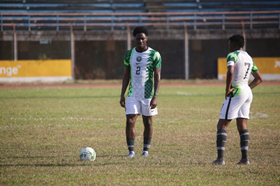How Lil Bands grew from a ‘ragtag’ start to become a major First Nations hockey tournament
The Lil Bands hockey tournament of 20 years ago would have been unrecognizable to anyone entering the Dryden and Eagle Lake arenas this week.
Thirty-eight First Nations youth hockey teams from across northern Ontario — and one from Manitoba — are in Dryden for this year’s tournament, which began Tuesday and runs through Sunday.
And the players, to be sure, have been having a blast. Several told CBC News they’re enjoying the games themselves, along with the off-the-ice events Lil Bands offers.
Beth Gagnon was playing with her home community of Deer Lake. Outside of Lil Bands, she goes to high school in Thunder Bay and plays for the Thunder Bay Queens.
“It means a lot to me and my family that I represent,” she said. “It’s fun playing here.”
Gagnon is doing double duty at Lil Bands, hitting the ice for both a boys’ team and girls’ team from Deer Lake.
“The boys … there’s much more speed involved, and you’ve gotta think faster,” she said. “But it’s also fun playing for the girls because I have much more time.”
But two decades ago, when the tournament got its start, things looked much different.
A tournament with a mission
“We started with about four teams, ragtag, mismatched ages and whatnot,” said Ziggy Beardy, one of the organizers of the first tournament, which took place over a day and a half in Sioux Lookout in 2001.
“We just decided to just test the waters and see if there’s an interest, or a need to have a youth tournament in Sioux Lookout,” he said. “After it was over, the young people said: ‘Is that it? Is there more?’
“So that’s how it all started.”
WATCH | Ziggy Beardy explains how it all started:
Ziggy Beardy helped start the Lil Bands hockey tournament 20 years ago. Since then, it’s grown from a ‘rag tag’ tournament of four teams, to the top tournament for young First Nations hockey players in northwestern Ontario. He explains how that happened, and the mission to provide a positive space for young people.
Stephen Fiddler, who was also involved in organizing the first Lil Bands tournament, said he’d often travel to northern communities for his job, and noticed there wasn’t much in the way of sports available for kids.
“I was having dinner with my wife, my late wife,” Fiddler said. “I started talking to her about I wanted to start a kids’ hockey tournament, and she said, ‘You should start one.'”
Three years later, Fiddler was booking ice time in Sioux Lookout.
“It’s just something I wanna do for the kids,” Fiddler said. “I don’t know what to say … I just wanna do it.”
Fiddler said the high rate of youth suicide in northern communities is one of the reasons the tournament is so important, and he wants to help do something — even if it’s just a small part.
“Communities bring their kids, come and play hockey,” Fiddler said. “This is probably the only tournament they go to.”
‘It’s about fun, it’s about community’
Kiiwetinoong MPP Sol Mamakwa said the Lil Bands tournament, and hockey itself, is important for youth from northern communities.
“It’s prevention from suicide,” Mamakwa said. “It gives them something to look forward to. Hockey could be a life-saver for some kids. That’s why it’s so important to be able to support these youth tournaments, and support the youth.”
Many First Nations in northwestern Ontario do not have access to artificial ice, and with a warmer-than-normal start to January, some teams might still have a bit of rust on them, he said. But after a few games, everything starts to click and everyone has fun.
“That’s what it’s all about,” Mamakwa said. “It’s about fun, it’s about community, it’s about competing and getting to know others.”
WATCH | How hockey can be a lifeline to kids in remote communities:
Hundreds of young hockey players and their families from First Nations across northwestern Ontario have gathered in Dryden for the Lil Bands Hockey Tournament. Sol Mamakwa explains the importance of the tournament and why hockey is a ‘life line” for some as their communities battle the ongoing suicide crisis.
Things have certainly grown since those early days: in Dryden, host of the 2023 Lil Bands tournament, 38 teams from 12 communities are competing in seven age divisions.
For Deer Lake, just getting everything organized in advance of Lil Bands was quite an endeavour: the community has a team playing in each of those seven divisions.
“We just all work together when we start planning the travel and the hotel arrangements and all that stuff, the drivers, the chaperones,” said Denise Aysanabee, manager of Deer Lake’s junior and senior girls’ teams. “We all have our responsibilities, but we come together when it comes to the travel.”
Prior to the COVID-19 pandemic, Aysanabee said the community would fundraise to help pay for travel and hotel rooms. This year, however, the community relied on donations and the teams were flown from Deer Lake directly to Dryden.
For Sharon Quequish of North Caribou Lake, the Lil Bands tournament is a family affair.
Quequish is one of the organizers for North Caribou, ensuring teams are set to compete in Lil Bands. And this year, her granddaughter, Kaila Waswa, is among the players representing the community in Dryden.

Quequish and the other organizers had their work cut out for this year, as they only had two weeks to prepare for the trip to Lil Bands.
“First, I went to the radio station,” Quequish said. “I said we only have this amount of time. I’m willing to co-ordinate it and willing to organize it, but I will need a lot of help.
“And the parents have to … register their children right away, because and we had little money set aside.”
The benefits of hosting Lil Bands
Lil Bands was on hiatus for three years prior to 2023, due to the pandemic, but the work to get the North Caribou teams to Dryden was worth it, Quequish said.
“I like it when the kids are so happy. To see them smile, I like that.”
The tournament itself is also important for the host community. This year, players, families, coaches, organizers and chaperones are staying in Dryden, and that is having a positive effect on the economy.
“In the summer months, tourism is massive,” said Steve Belanger, Dryden’s manager of community services. “We live in a special part of the world here, where the fishing and the hunting is probably A-plus, and we get a lot of traffic.
“But when we head into the winter months, we see the traffic slow down,” he said. “These tournaments carry them through the long cold winter months and ensure that the motels are full, that the businesses are full, that the restaurants can get by.”




